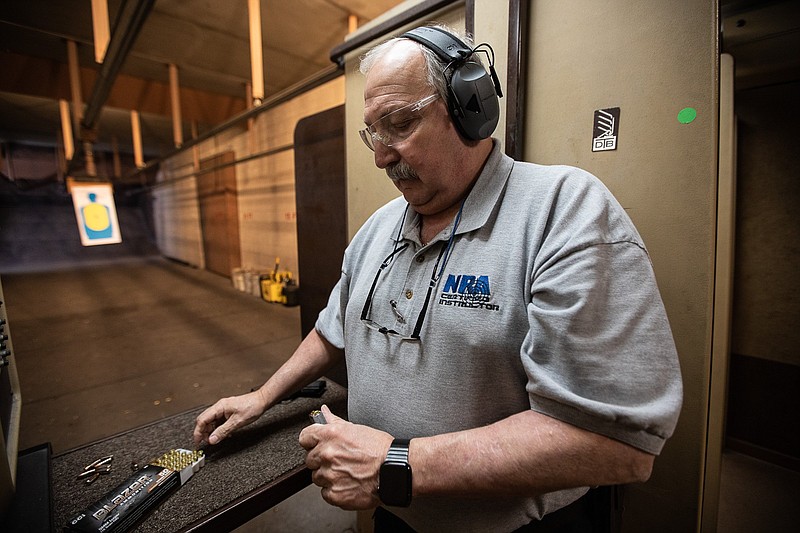NASHVILLE - Beginning July 1, most Tennesseans ages 21 and older will no longer be legally required to undergo state criminal background checks, firearms training or demonstrate firearm competency in order to carry a handgun either openly or concealed while in public.
But residents may need to be mindful should they choose not to obtain or renew their current "enhanced" gun-carry permits under Gov. Bill Lee's new "permitless carry" or "constitutional carry" law that passed the General Assembly earlier this month. The legislation was signed by Lee, a Republican, on April 8 and codified as Public Chapter 108 on April 12.
While 18 other states have similar laws on their books - with 10 added in the past six years - a number of other states don't recognize permitless-carry under their reciprocal agreements with states.
If you don't have a Tennessee-issued enhanced permit in those states, it could land you in legal hot water.
Lee, who is seeking reelection next year, first brought the legislation in 2020 but dropped his push amid last year's coronavirus pandemic. This year, he resumed the effort, resulting in one of gun-rights advocates' most far-reaching successes yet in their decadeslong push to overhaul Tennessee's gun-carry laws.
Changes to Tennessee handgun-carry law first got serious traction back in 1989, when state lawmakers passed a law stating county sheriffs "may issue" a handgun carry permit to authorize "any person" to carry a handgun.
Over the past 32 years, the law continued evolving. In 1996, for example, a landmark law passed that transferred responsibility for issuing handgun carry permits from the counties to the Tennessee Department of Safety and Homeland Security. It also standardized the permitting process to be the same application process and fee structure statewide. A majority of GOP lawmakers have supported such measures. The Times Free Press reported in 2009 that one in four of them had permits.
Still, some think the new law doesn't go far enough. For example, it doesn't apply to long guns and a number of advocates, including the Tennessee Firearms Association, believe it should. A legal challenge has already been filed in U.S. District Court in Knoxville by a pro-Second Amendment group.
Current Tennessee law
Under a 2019 law, Tennesseans must have either an enhanced handgun-carry or a concealed carry permit to carry a handgun in public. Both require criminal background checks conducted by the state Department of Safety and Homeland Security.
The Enhanced Handgun Carry Permit allows a person to carry a handgun in public either openly or concealed. To get the permit, applicants must complete an up to eight-hour, in-person course taught by a certified instructor that includes live-fire instruction and demonstration of proficiency with a handgun.
Firearms instructors charge varying fees for the courses. The annual state government permit itself costs $100 for eight years with option to purchase a lifetime permit for $300. Current and former military personnel pay $65 for the enhanced permit. Retired law enforcement personnel can obtain permits free.
Under the current Concealed Handgun Carry Permit process, applicants must complete watching at least a 90-minute video or online course from a state-approved vendor covering firearm safety, proper use of firearms and protocols. It includes a test or quiz intended to confirm their competency. The state permit costs $65.
The new law leaves both permitting processes in place.
Bob Drews, assistant manager and head instructor at Shooter's Supply and Indoor Range on Hixson Pike in Chattanooga, said he hopes Tennesseans will continue to see the need to get formal training.
"If you're legally allowed to own a firearm, we believe everyone should be able to have a firearm God bless you," said Drews, who has a law enforcement background. But he noted he has seen some newcomers unaware of fairly basic gun safety precautions such as keeping their finger off a firearm's trigger until they're ready to shoot.
"Get some training and do it the safe way," Drews advised.
New provisions
The new law applies to people 21 and older, and members of the military ages 18 to 20 are also included.
The law in essence creates an exception to Tennessee criminal law, allowing residents to carry without obtaining a permit.
But while it removes a criminal misdemeanor penalty for carrying a handgun without a permit, it toughens sanctions in some areas.
For example, it increases theft of a firearm from a misdemeanor punishable by up to 30 days in jail to a felony with a minimum of six months.
It requires people convicted of the following offenses to serve at least 70% of their court-imposed sentences:
> Unlawful possession of a firearm by a person convicted of a felony crime of violence, an attempt to commit a felony crime of violence or a felony involving use of a deadly weapon.
> Unlawful possession of a firearm by a person convicted of a felony drug offense.
> Unlawful possession of a handgun by a person convicted of a felony.
> Unlawfully providing a handgun to a juvenile or permitting a juvenile to possess a handgun.
It bars felons convicted of possessing a firearm from early release.
State revenue loss
According to a financial analysis by the General Assembly's Fiscal Review Committee, the law is expected to cost state government about $25 million a year.
That includes a projected $12.52 million loss due to the fewer number of permits Tennesseans seek.
There's also a $12.3 million expected annual expenditure projected for the increased penalties when it comes to housing prisoners.
Who can't carry
The new law says these categories of offenders are not eligible to carry a firearm:
> Someone convicted of a felony.
> Someone convicted of domestic violence offenses.
> Someone convicted of stalking.
> Someone committed by a court to a mental institution.
> Someone with a recent DUI conviction.
Background checks
The new law does away with state criminal background checks for those opting to take advantage of permitless carry. Many purchasers of firearms, however, will remain under the federal government's National Instant Criminal Background Check System, the national name check system. It requires federally licensed firearms dealers including gun shop owners, pawn shop dealers and retailers to check if a person can lawfully buy or own a firearm.
The federal background check law does have some exclusions, including person-to-person sales where a private seller is not a licensed firearms dealer.
Who opposed the law?
The Tennessee County Sheriffs Association, the Tennessee Chiefs of Police and the Tennessee Bureau of Investigation all opposed the bill.
New law hit with legal challenge
Tennessee is already being sued over the law. But the legal action filed last week in U.S. District Court in Knoxville didn't come from longtime critics of permitless carry such as Moms Demand Action.
The pro-Second Amendment Firearms Policy Coalition says it filed the suit on behalf of three "law-abiding" people between the ages of 18 and 21 who don't fall within the law's category allowing people of those ages to carry without permits provided they serve or have served in the military.
"Tennessee's statutory scheme unconstitutionally denies a large number of adults their fundamental, individual right to bear arms outside the home," said Adam Kraut, Firearms Policy Coalition's senior director of legal operations, in a statement. "The text of the Second Amendment makes clear that the right to keep and bear arms 'shall not be infringed,' and nothing in America's history and tradition supports Tennessee's laws banning carry by adults under age 21."
700,000-plus handgun carry permits
According to a 2020 year-end report issued by the Tennessee Department of Safety and Homeland Security, 716,027 Tennesseans had either an enhanced or a concealed carry permit.
The breakdown for Southeast Tennessee is:
Hamilton County: 33,322
Bradley County: 12,752
Monroe County: 5,932
Rhea County: 3,935
Marion County: 3,446
Sequatchie County: 2,097
Polk County: 1,893
Grundy County: 1,707
Meigs County: 1,673
Contact Andy Sher at asher@timesfreepress.com or 615-424-0484. Follow him on Twitter @AndySher1.

